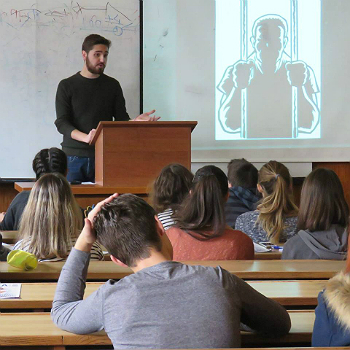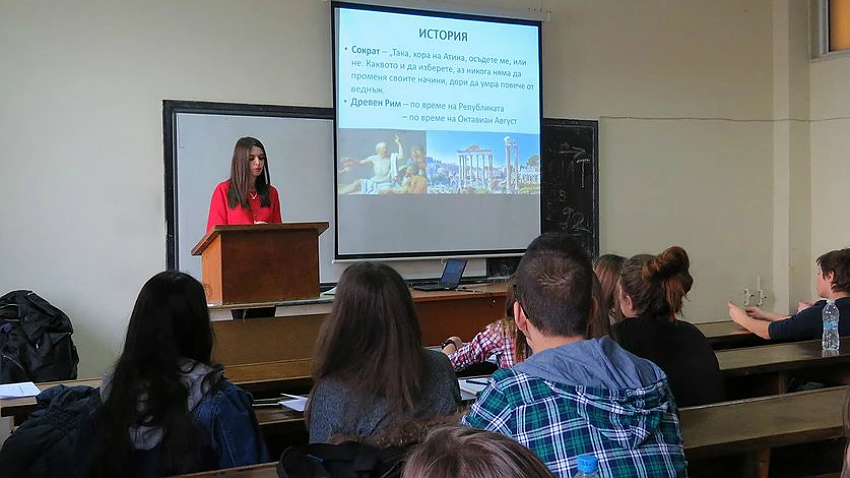Around two years ago a group of law students from Sofia University St. Kliment Ohridski decided to establish the first of its kind Civil Education Academy in Bulgaria. They aim at raising the legal culture of the students and want to encourage those to know and defend their rights and freedoms, as this is one of the steps for the creation of a fairer society. That is why they hold free and very understandable discussions for students from the 11th and 12th degrees on subjects, related to the state and the law. One of the Academy’s founders and now Ethics & Law teacher with the Miguel de Servantes Spanish Language High School in Sofia – Vasil Lozanov, a law graduate, gives us more details:
 “We find it essential to carry out a bilateral process – hence the ‘discussions’ term and not ‘lectures’ or ‘lessons’. When we present the topics, we often ask the students a lot of questions with the purpose of provoking their thoughts and reactions. The method has already proven to be very efficient – they either know the answer already or discover it via a discussion. The majority of the students come very motivated. Whenever they get something wrong, we don’t remark, but explain the logics of the lawmaker. There is this phenomenon that we jokingly call ‘the avalanche’ – they find it hard to start participating over the first minutes of the talk, but whenever a student or two speak up, the rest rush to join in. We also receive a lot of questions during the breaks and right after the discussions and we also have lots of social media visits. We always pay personal attention at anyone’s request.”
“We find it essential to carry out a bilateral process – hence the ‘discussions’ term and not ‘lectures’ or ‘lessons’. When we present the topics, we often ask the students a lot of questions with the purpose of provoking their thoughts and reactions. The method has already proven to be very efficient – they either know the answer already or discover it via a discussion. The majority of the students come very motivated. Whenever they get something wrong, we don’t remark, but explain the logics of the lawmaker. There is this phenomenon that we jokingly call ‘the avalanche’ – they find it hard to start participating over the first minutes of the talk, but whenever a student or two speak up, the rest rush to join in. We also receive a lot of questions during the breaks and right after the discussions and we also have lots of social media visits. We always pay personal attention at anyone’s request.”
The project includes the 300 Seconds of Law educational video series. Over 230 students from Sofia and Gotse Delchev have already taken part in the course with growing interest, Vasil Lozanov adds:
“Over the 2017/2018 school year the Academy will take place across seven Bulgarian cities and towns. In 2018 we would like to reach students from smaller settlements. The towns of Vidin, Velingrad, Haskovo, Gorna Malina, Dolna Malina and Kostenets have shown interest towards our initiative.”

The second aspect of the Academy is aimed at civil education – students are encouraged to think and express their position. The discussions seize topics, important for each citizen, but mostly left outside the school curriculum – state institutions, separation of powers, basic human rights and freedoms, freedom of speech, also crime and justice. The Academy’s team upholds the idea of classes in civil and legal education at school:
“Legal education is not enough covered nowadays at school and this has been one of the engines of our activities. The respective topics are now covered in the 10th and 12th grades, and that leaves a gap of a whole school year in between. The 16-year-olds have totally different interests and many of them are not mature enough to show curiosity for legal subjects, as the educational system has so far shown in no way the importance of law in regard to its impact on our everyday life. On the other hand, in the 12th grade they are on the verge of a crucial choice of whether to go to college or not, and where; so the World & Personality subjects seem to only rush quickly somewhere aside. Legal literacy is far away from both students and more mature citizens. However, we should start somewhere and we do believe that the seeds of knowledge should be planted asap, in order for not only information, but a way of thinking to grow as a result.”
Anyone interested in the Academy’s activities may contact the team at www.ago-academy.org.
English version: Zhivko Stanchev
The beach, waves, sea and blue cloudless sky. But in order for the vacation to remain serene, everyone should be well aware of the risks that this seemingly calm picture of summer hides. In their practice, lifeguards have repeatedly..
There are many Bulgarian schools in the United States, with the oldest one founded by the Bulgarian diaspora in Chicago. In addition to the well-known Sunday schools, there are many other forms of educational initiatives through which the Bulgarian..
Tomato Day will take place in early September at the Botanical Garden in Budapest, Hungary. The Bulgarian Republican Self-Government in the Hungarian capital announced this on its Facebook page. Gabriela Hadzikostova: Bulgarians in Hungary enjoy..
There are many Bulgarian schools in the United States, with the oldest one founded by the Bulgarian diaspora in Chicago. In addition to the well-known..
The beach, waves, sea and blue cloudless sky. But in order for the vacation to remain serene, everyone should be well aware of the risks..

+359 2 9336 661
